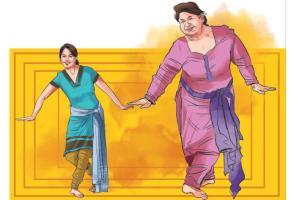sarojjis scornful smirk tells us what she thinks of Indian morality, and the firm knowledge that men will be men.

Illustration/Uday Mohite
 Indian filmmakers have a very ambivalent attitude towards song and dance, Indian cinema's USP, especially in an international setting. Once I was on the FIPRESCI Jury (International Federation of Film Critics) of the Berlin Film Festival in 2000, and watching Mani Ratnam's Dil Se (From the Heart). He had sent an 'international cut' with hardly any songs. Fellow juror Derek Malcolm protested, "What! A Mani Ratnam film without the songs? Tell him we want only the songs." He was half-jesting, of course, but it tells you how much the Indian art of song picturisation and choreography is also admired worldwide.
Indian filmmakers have a very ambivalent attitude towards song and dance, Indian cinema's USP, especially in an international setting. Once I was on the FIPRESCI Jury (International Federation of Film Critics) of the Berlin Film Festival in 2000, and watching Mani Ratnam's Dil Se (From the Heart). He had sent an 'international cut' with hardly any songs. Fellow juror Derek Malcolm protested, "What! A Mani Ratnam film without the songs? Tell him we want only the songs." He was half-jesting, of course, but it tells you how much the Indian art of song picturisation and choreography is also admired worldwide.
ADVERTISEMENT
I was recalling this as ace dancer-choreographer Saroj Khan, who left her distinctive stamp on Bollywood song and dance, died of a heart attack, at 71, on July 3. Winner of three National Film Awards for choreography, she had choreographed over 2,000 songs in a rich, 66-year-long career as dancer-choreographer, from Aagosh (1953) to Kalank (2019). Since independently choreographing for Geeta Mera Naam (1974), she became famous for Hawa Hawai with Sridevi (Mr India, 1987), followed by a long collaboration with Madhuri Dixit from Ek do teen (Tezaab, 1988) onwards. Her most popular dances included these and Dola re dola (Devdas), Choli ke peeche kya hai (Khalnayak), Nimbooda (Hum Dil De Chuke Sanam) and countless others. Although best known for her raunchy songs with jhatkas and matkas, her repertoire also included a wide range from classical and folk, to seductive, saucy and fun dances, from the folksy Bichua in Bimal Roy's Madhumati to classical Bharata Natyam in Sharada Ramanathan's Sringaram, which got her her first National Film Award.
It's lovely to revisit Nidhi Tuli's marvellous documentary, The Saroj Khan Story, produced by the Public Service Broadcasting Trust (PSBT)-Films Division and Rangrez Films (57 mins, 2011, freely available online), that is insightful, poignant and hilarious. Sarojji married her dance teacher B Sohanlal, though she was 13 and he was 43; but he dumped her when their son was six months old, so she raised her children alone. Later, her daughter Kuku died as well. "Dance helps me get away from everyone," she said.
In the film, Sanjay Leela Bhansali describes how, while shooting Dola re dola, "she was like a school to me, on how to shoot a dance song," how she 'dynamised the space,' weaving foreground with background, she knew what would work with the public—all the while writhing on the floor in pain, as she was very sick. There's also a hilarious anecdote about how she silenced a Censor Board woman who wanted to chop the Dhak dhak karne laga song from Beta, "because you are deliberately shaking." Sarojji's scornful smirk tells us what she thinks of Indian morality, and the firm knowledge that men will be men.
Indian culture effortlessly merges the sacred and profane, for example, a song describing the beloved could be a lover or god—and even a god like Krishna makes his beloved Radha mad by turning up with love bites all over. So too, Sarojji's choreography, while strongly rooted in Indian classical and folk dance, could be full-on raunch, with pelvic thrusts, bump-and-grind, bosom heaving—notable for Madhuri's self-breast-squeezing gesture in Choli ke peeche kya hai, and more. Often shot from a male POV, one could argue that such erotic dances can unleash men's repressed sexual passions, with horrific consequences for women in the conservative Indian society. But some of her women also have sexual power, agency over the men, even a sauciness, that onscreen Indian women rarely possess.
So, this is a treacherous, debatable terrain.
"Bijli girane main hoon aayi," went the lyrics of Hawa Hawai—I've come to strike like lightning. And boy, did she!
Meenakshi Shedde is India and South Asia Delegate to the Berlin International Film Festival, National Award-winning critic, curator to festivals worldwide and journalist. Reach her at meenakshi.shedde@mid-day.com
Catch up on all the latest Mumbai news, crime news, current affairs, and a complete guide from food to things to do and events across Mumbai. Also download the new mid-day Android and iOS apps to get latest updates.
Mid-Day is now on Telegram. Click here to join our channel (@middayinfomedialtd) and stay updated with the latest news
 Subscribe today by clicking the link and stay updated with the latest news!" Click here!
Subscribe today by clicking the link and stay updated with the latest news!" Click here!






